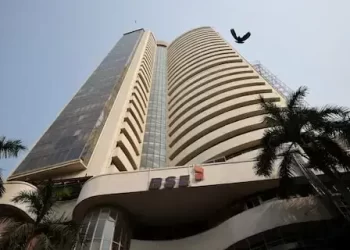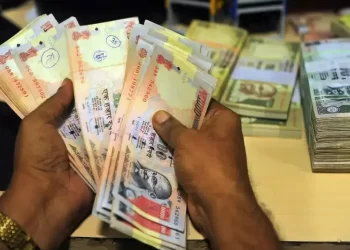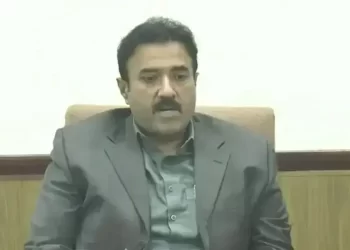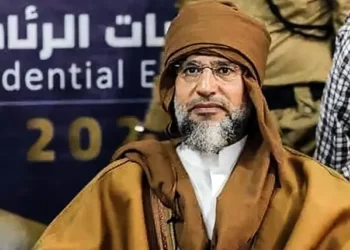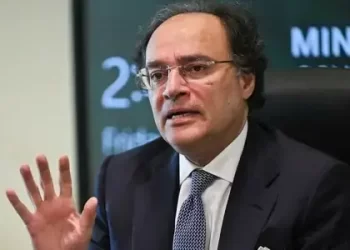Pakistani PM Shehbaz Sharif visited China, Saudi Arabia and the UAE recently searching for investments. But analysts say he first needs to fix things at home.
Islamabad, Pakistan — In a series of trips over the past three months, Pakistan Prime Minister Shehbaz Sharif has tried to convince the debt-strapped country’s three closest allies — China, Saudi Arabia and the United Arab Emirates — to invest in the nation, as its precariously positioned economy looks for green shoots.
In June last year, under Sharif’s first tenure as prime minister, the government formed a Special Investment Facilitation Council (SIFC), a high-powered body comprising Pakistani civilian and military leaders, to promote investment in Pakistan.
Following the tours to Beijing, Riyadh and Abu Dhabi, the Sharif government is pointing towards a raft of memorandums of understanding signed on those trips as indicators of potential investment coming to Pakistan.
However, analysts caution that the attempts to get foreign direct investment (FDI) will work only if Pakistan can promise a stable political landscape and bring structural reforms to its economy.
So what did Pakistan get out of Sharif’s trips, and what does it need to do to attract investments as it prepares to negotiate with the International Monetary Fund (IMF) to enter its 24th loan programme since 1958?
After taking office in March for the second time, Sharif paid two visits to Saudi Arabia in April. These tours were followed by a series of visits by senior Saudi officials, including the defence and foreign ministers, to Pakistan. In early May, a 50-member Saudi business delegation also flew down to participate in an investment conference.
In his two meetings with Saudi Crown Prince Mohammed bin Salman in April, Sharif discussed opportunities to enhance economic cooperation between the two countries and explored the possibility of a $5bn investment package.
“We have identified areas of cooperation, both at the government-to-government and business-to-business levels, and that has been clearly identified. We now have a clear-cut way forward,” Sharif told Al Arabiya TV news in May.
“There is no question that Pakistan needs investment. Just 18 or so months ago, we were on the verge of default, but because of these dialogues and engagement with friendly countries, we are letting them know what we can offer,” he told media.
A senior Pakistani government official who has been part of negotiations with the Saudi delegations said Pakistan was hopeful Riyadh would invest from its Public Investment Fund (PIF), the kingdom’s sovereign wealth fund with estimated assets of more than $900bn. “They are obviously seeking investment opportunities and trying to follow their vision,” the official said on condition of anonymity.
Negotiations on the proposed $5bn investment are under way, the official added.
“Right now, we are in the discussion stage, which has started. As and when these negotiations mature, things will clarify and we will see what the final deals are like,” he added.
Sharif followed up his Saudi visits by making a one-day visit in late May to the UAE, another long-term partner for the country, during which he met President Sheikh Mohammed bin Zayed Al Nahyan.
$5bn from Saudi Arabia?
Following the meeting between the leaders, the Pakistan Prime Minister’s Office announced that the UAE had committed to $10bn in investment in Pakistan in various fields.
The UAE Ministry of Investment confirmed the pledge. But a month later, few details are available on which sectors the UAE might invest in, and if the two sides have agreed to a timeframe for the investments.
The visit came two months after armed men attacked a bus carrying Chinese engineers who were working on a major hydropower plant in Pakistan’s north, killing at least five Chinese nationals and one Pakistani.
The attack was one in a series of setbacks to projects built under the ambitious China-Pakistan Economic Corridor, a $62bn project launched a decade ago, when Sharif’s elder brother Nawaz, himself a three-time prime minister, was the premier of the country.
The last 10 years have seen Pakistan’s reliance on China growing significantly, as the relationship, which was once centred on military ties, has expanded into the economic arena in a big way: Pakistan owes China nearly $30bn out of its total foreign debt obligations of nearly $130bn.
The country’s economic managers have emphasised that unless there is significant foreign investment, Pakistan will not be able to meet its ambitious 3.6 percent growth rate, which the country has targeted for the next fiscal year.
Following Sharif’s return from Beijing, both Chinese and Pakistani governments issued statements about increased focus on security, as well as forging an “upgraded version of CPEC” to better help Pakistan’s economic and social development.
But despite signing 23 MoUs in various sectors during Sharif’s visit, there was no concrete agreement beyond shows of intent, on any project that the two nations might prioritise.
Ever since the creation of the SIFC last June, the government has credited the organisation with helping facilitate investment opportunities from outside the country.
The latest available central bank data reveals that from July to April this year, Pakistan received $1.45bn in investments, an increase of a paltry 8.1 percent from last year.
However, analysts say that while the three recent visits showed Pakistan’s desperation to attain financial support, whether in the form of bank deposits or investment projects, the failure to realise the projects substantially was due to Pakistan’s volatile landscape.
“The reason for non-materialisation of any investments or such projects lies in the chronic political instability in the country and the structural issues plaguing Pakistan’s economy,” Umer Karim, an associate fellow of King Faisal Center for Research and Islamic Studies, told media.
Economic analyst Uzair Younus also concurs, saying the fundamental issue for Pakistan remains the question of the broader environment within the country.




